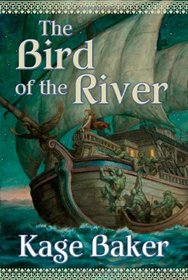This is a melancholy book, both because of its subject matter and because it is likely the last Kage Baker book I will ever see published, given her death last January. The speculative fiction field is lessened by her loss, and this book is a reminder of exactly why.
I suspect I will be in the minority in holding this opinion. It's a slight book, both in length and in that it is one in which not a whole lot happens. The heavy-duty world-building went on in the previous two novels, and this one is essentially nothing more than a gentle coming-of-age travelogue and romance. It has a likeable young protagonist, some light adventure, some not-very-dark secrets, and a happy ending. All of that is usually enough for a young adult audience, which is why I think it will work best when aimed at that reading level.
But that's just the gloss, the stuff the publisher sees (based on the jacket description which, as always with Baker's novels, spoils some things better left unspoiled and gets other things completely wrong). At its core this novel is just as subversive as the two that came before in this gloriously zany fantasy world -- unlike 95% of fantasy written today, it is a novel about the commonplace events that make up the lives of the vast majority of people inhabiting any world, real or imagined. It very gently paints a portrait of the lower classes, the working (and non-working) poor, whose lives are counted so negligibly by the characters portrayed in most fantasy novels. It's about the everyday tragedies of a hard life, and the way small lives get swallowed up by large ones, and the difference that creates in perception.
There is a beautiful passage between Eliss and Krelan where they talk about the way they see the universe. Krelan, living amongst the nobility his entire life, waxes on about how ordered the world is, the strict hierarchies keeping everyone in balance, in their place. And Eliss, whose idea of luxury is eating at a Red House (an establishment Krelan thinks terribly declasse) breaks in to say "But there isn't any balance. That's just made up. A Diamondcut can end up dead in the river mud, and a demon can fall in love with a goddess. Things just happen. Sometimes they're even good things."
That viewpoint is exactly the viewpoint so often missing from fantasy worlds. This loosely related trilogy, no matter its outer trappings, has always been about the value in seeking happiness, in forming families, in striving to be true to individuals rather than principles, and in enjoying life today, because it is a fragile thing. And that message, when delivered in such a gently beguiling way, is one I hope resonates with everyone who reads it.
I suspect I will be in the minority in holding this opinion. It's a slight book, both in length and in that it is one in which not a whole lot happens. The heavy-duty world-building went on in the previous two novels, and this one is essentially nothing more than a gentle coming-of-age travelogue and romance. It has a likeable young protagonist, some light adventure, some not-very-dark secrets, and a happy ending. All of that is usually enough for a young adult audience, which is why I think it will work best when aimed at that reading level.
But that's just the gloss, the stuff the publisher sees (based on the jacket description which, as always with Baker's novels, spoils some things better left unspoiled and gets other things completely wrong). At its core this novel is just as subversive as the two that came before in this gloriously zany fantasy world -- unlike 95% of fantasy written today, it is a novel about the commonplace events that make up the lives of the vast majority of people inhabiting any world, real or imagined. It very gently paints a portrait of the lower classes, the working (and non-working) poor, whose lives are counted so negligibly by the characters portrayed in most fantasy novels. It's about the everyday tragedies of a hard life, and the way small lives get swallowed up by large ones, and the difference that creates in perception.
There is a beautiful passage between Eliss and Krelan where they talk about the way they see the universe. Krelan, living amongst the nobility his entire life, waxes on about how ordered the world is, the strict hierarchies keeping everyone in balance, in their place. And Eliss, whose idea of luxury is eating at a Red House (an establishment Krelan thinks terribly declasse) breaks in to say "But there isn't any balance. That's just made up. A Diamondcut can end up dead in the river mud, and a demon can fall in love with a goddess. Things just happen. Sometimes they're even good things."
That viewpoint is exactly the viewpoint so often missing from fantasy worlds. This loosely related trilogy, no matter its outer trappings, has always been about the value in seeking happiness, in forming families, in striving to be true to individuals rather than principles, and in enjoying life today, because it is a fragile thing. And that message, when delivered in such a gently beguiling way, is one I hope resonates with everyone who reads it.




